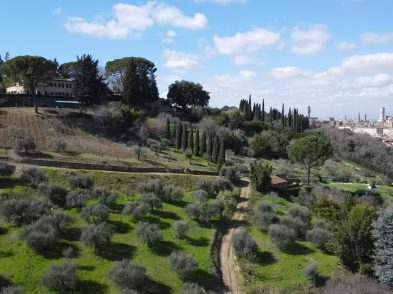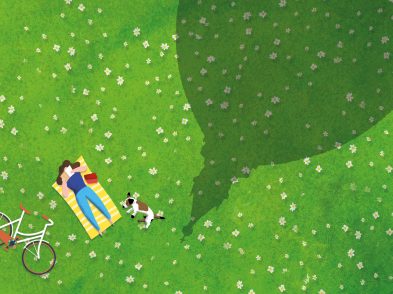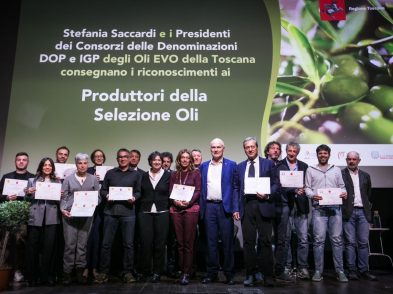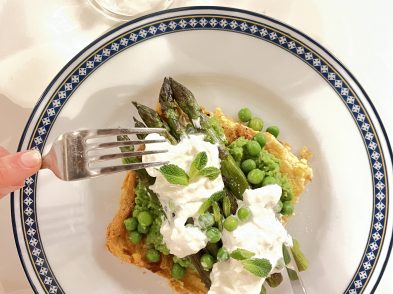The Florentine‘s Helen Farrell speaks with Salvatore Ferragamo, CEO of Il Borro Relais & Chateaux and organic winery in Tuscany, and Vittoria Ferragamo, head of special projects at Il Borro, about the estate’s organic wines, farm delivery project and adapting to the needs of a post-COVID market.
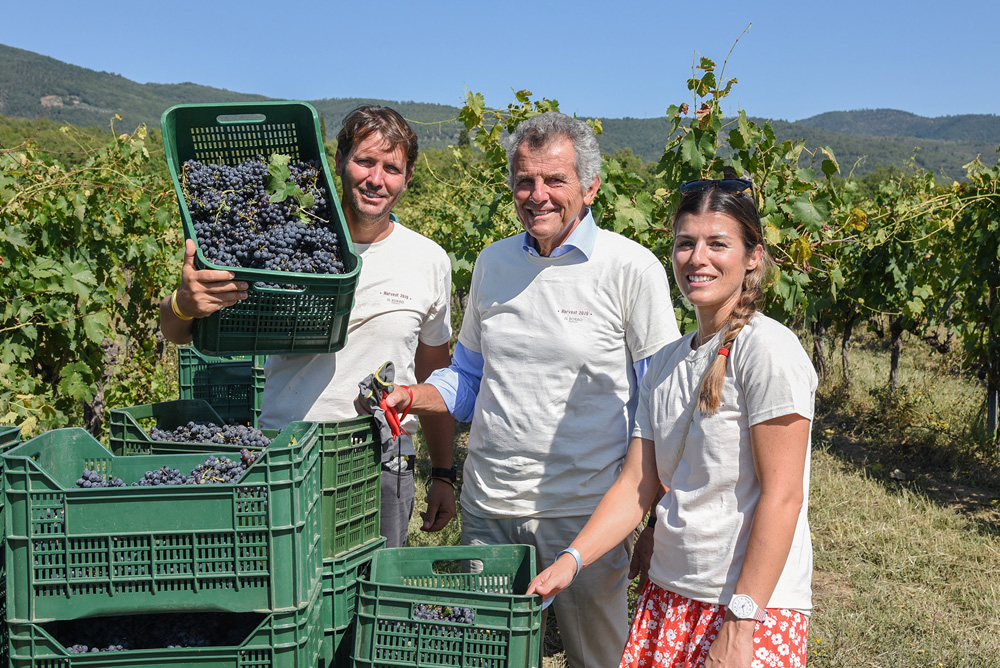
Salvatore Ferragamo (left) with father Ferruccio and sister Vittoria at their annual harvest party | ph. Marco Badiani
Helen Farrell: Could you give us a bit of Il Borro’s history?
Salvatore Ferragamo: We purchased the property at Il Borro back in 1993, before the Tuscany that we know today, and it was in a complete state of abandonment. The roofs were leaking; agricultural activity had long ceased. But my father and us children fell in love with it, saw the potential and were fortunate enough to be able to invest in it. I’ve historically followed the wine and hotel side of things, while my sister Vittoria is in charge of all the special projects on the property. We’ve completely restored it, this 1,000-year-old medieval hamlet, which now has a five-star Relais & Chateaux resort. We also have two restaurants on site, and everything produced in my sister Vittoria’s vegetable garden is available to the chefs. Then we have the winery, the spa, the horses, the golf. We’ve invested heavily in wine production, and in the concept of sustainability, which applies to all of Il Borro’s 1,100 hectares. The hotel is solar-powered: we produced three times as much solar energy as we consume, so we actually qualify as a negative carbon-footprint property, and in 2015 we were certified organic. We’re only 45 minutes south of Florence, close to Arezzo, but we have everything we need: a farm, a hotel, a winery. We also have restaurants in Florence and Dubai, and in October we’re planning on opening an Il Borro Tuscan Bistro in Mayfair, London.
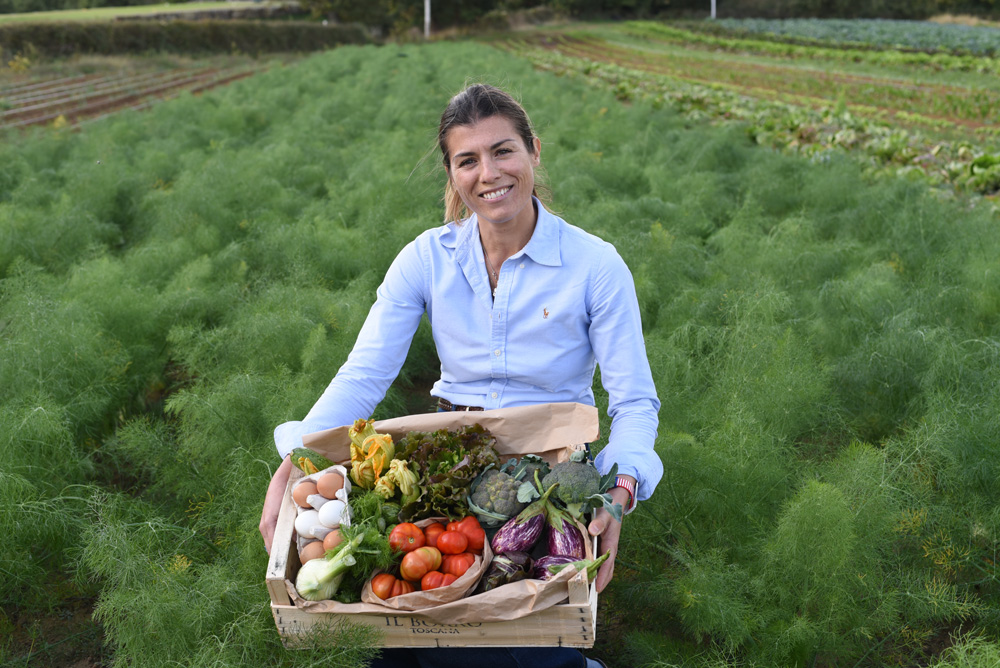
Vittoria Ferragamo with a box from Orto del Borro, her organic garden | ph. Marco Badiani
HF: And you, Vittoria, are very much involved in the organic, home-delivery service: Orto del Borro. How are you seeing the effects of the lockdown with your side of the business?
Vittoria Ferragamo: We’ve certainly had more requests during this period. People are much more sensitive to eating healthily, which goes hand in hand with the need to stay at home. We’re happy because our clients are happy with the variety we can give them from the vegetable garden. We deliver the boxes every week in the area surrounding Il Borro, to Arezzo, Florence and Siena, and each box includes six eggs from our free-range chickens. It’s only three years old, this project, but we hope that it’ll just keep growing.
HF: Back to Il Borro Wines, how is vineyard progressing so far this year?
SF: It’s been a wonderful spring, weather-wise. In Italy we’re very superstitious, and normally consider a leap year to be unlucky. I think we can safely say it has been an unlucky year, but one positive thing is that the weather has been fantastic. Unfortunately for everyone who works here in the wine division, I have been around constantly because I haven’t been able to do my usual 150 days of travelling. But I think we’ll find that 2020 will be a wonderful vintage, because all the producers are being tied to their vineyards and have had unlimited time to tend to them.
HF: Vittoria, did I read that you were thinking of introducing ancient grains and flours to the products you grow?
VF: Yes, that’s a dream that may come true soon. We’re going to have a mix of ancient grains and our own flours, which we’ll then make into pasta, and our customers will be able to get them in our delivery boxes as well. We’ll experiment with cakes and biscuits, and whatever else. We’re also delivering mozzarella, from a Neapolitan producer who works in Arezzo, and he only uses milk from the cows in Maremma. We’d like to start with our own cheeses very soon too, sheep cheeses like pecorino and ricotta.
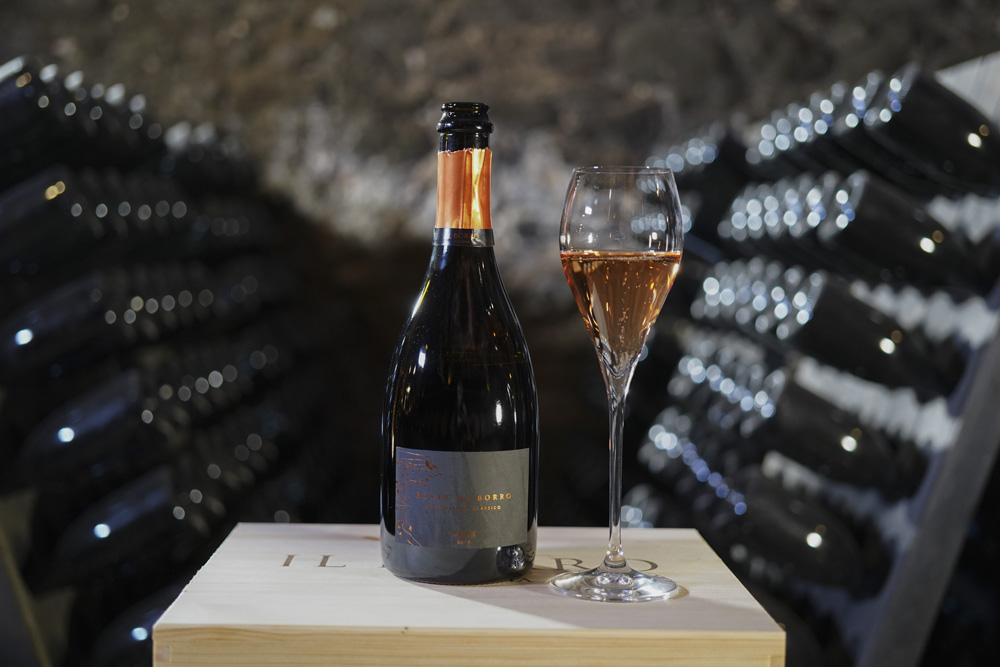
Bolle di Borro is a classic method rosé wine | ph. Alexandra Korey
HF: Let’s talk more about the wine. Bolle di Borro, for example, I find absolutely exquisite. It spends 60 months on the lees, correct?
SF: Very good! Sixty months on the yeast. It might be the only wine of its kind, in that regard. I know other producers that do a Champenoise-style rosé, but in our case we were brave enough to keep it aging in the cellar for five years. And in 2022 we’ll release a special 700 bottles, which will have done ten years on the lees. When we started the project back in 2012, I said to my father, “We’ve got to do something really unique. We can’t just do 24 months on the lees; we have to go further.” I convinced him. I don’t know if he knows, but I also keep a case hidden away from every vintage, so in 2022 we’ll be releasing a Bolle di Borro special reserve.
HF: We’re talking about a 100% Sangiovese, aren’t we?
SF: That’s right. Sangiovese vinified in a Champenoise style. Lovely fruity flavours, full of blackberries and cherries, but the 60 months on the lees also gives it that taste of bread crust.
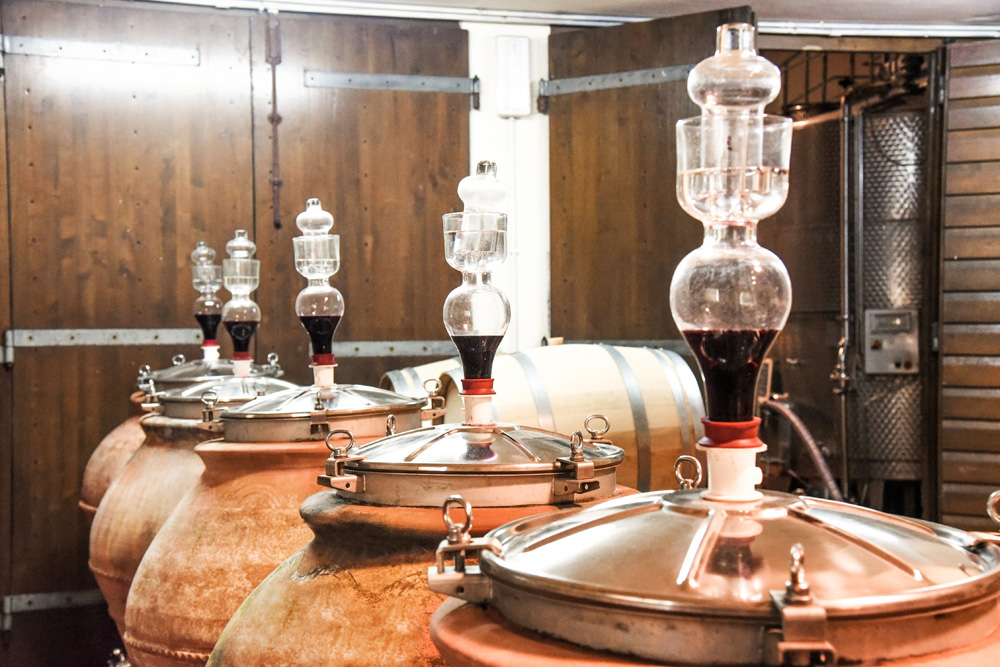
The terracotta pots in which Petruna is produced | ph Marco Badiani
HF: Sangiovese is something you like to experiment with at Il Borro, isn’t it? You have a number of variations on Sangiovese, and I know you’ve also been making it in clay pots?
SF: Yes, we use clay from Impruneta, which is ideal for making amphoras. Amphoras really take us back to the origins of wine, to Persia about 8,000 years ago, where they would transport wine in clay pots. Clay has a porous element to it, even more so than oak and wood. When you take away the oak, which we all love, you really pick up the fruit in all its different layers: it’s incredibly fruit-driven. It’s a very natural way of making wine: the grapes are harvested, pressed, and go into the amphoras, where they sit for one year. It’s really a lovely wine.
HF: Sangiovese is like your best friend, a homecoming.
SF: And it offers incredible variety. It can surprise you, and it changes enormously depending on the vintage. 2017 was a very dry and hot vintage here in Tuscany. We even got hit by frost in early April, but the results were phenomenal. We’re enjoying a new wine, Polissena, which has just joined a new DOC that we have here on the property. It’s a 100% Sangiovese that spends 12 months in barrique, and today it’s become a part of the Valdarno di Sopra DOC, the DOC that Cosimo de’ Medici created in 1716. We’ve reactivated this DOC with a local producer, and it’s the first DOC in the world to include 100% organic wines.
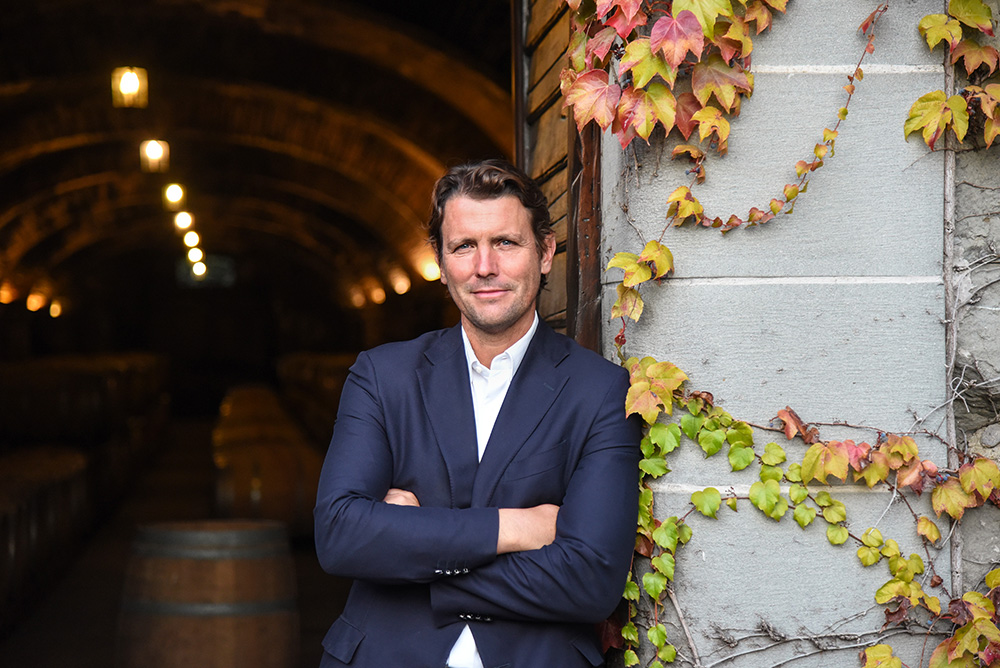
Salvatore Ferragamo at the door of his historic cellar | ph. Alexandra Korey
HF: Valdarno di Sopra is becoming a very interesting area. Can you tell us a little bit about the soil?
SF: We know that a couple of million years ago the Valdarno valley used to be a huge lake, but all that’s left of it now is the River Arno. The soil structure is quite diverse. We have the Pratomagno slopes – the steep, rocky slopes to the north – and a sandier, pebbly soil as you come down the mountains. In those pebbly patches we plant a Syrah, which does incredibly well, and produce a 100% Syrah called Alessandro del Borro. Further down in the valley you find a more compact, more clay-like type of soil. This new DOC doesn’t just focus on organic wines; it also focuses on terroir, so it takes an approach where producers can add value to certain wines and mention the name of the vineyard. So, a label can actually say that the grapes in a particular wine come from a particular vineyard. The French would call it a cru; we call it a vigna. So it’s a really well thought-out, innovative DOC.
HF: I imagine Il Borro lovers are wondering when they’ll be able to return. What are you planning to do with this 2020 season in order to salvage it?
SF: We’re looking at reopening on July 1, although of course it’s difficult to make any predictions. Being in the middle of the Tuscan countryside, social distancing comes quite naturally to us. We’re working on a protocol, in terms of masks and hand sanitizers, and ways of distancing tables in the restaurant. We’re working with the villas we have here on the property. We just have to keep going and find a way. I believe we should fight the virus on a moral level as well and send a good sign that we are open for business, while taking the utmost care of our guests and colleagues.
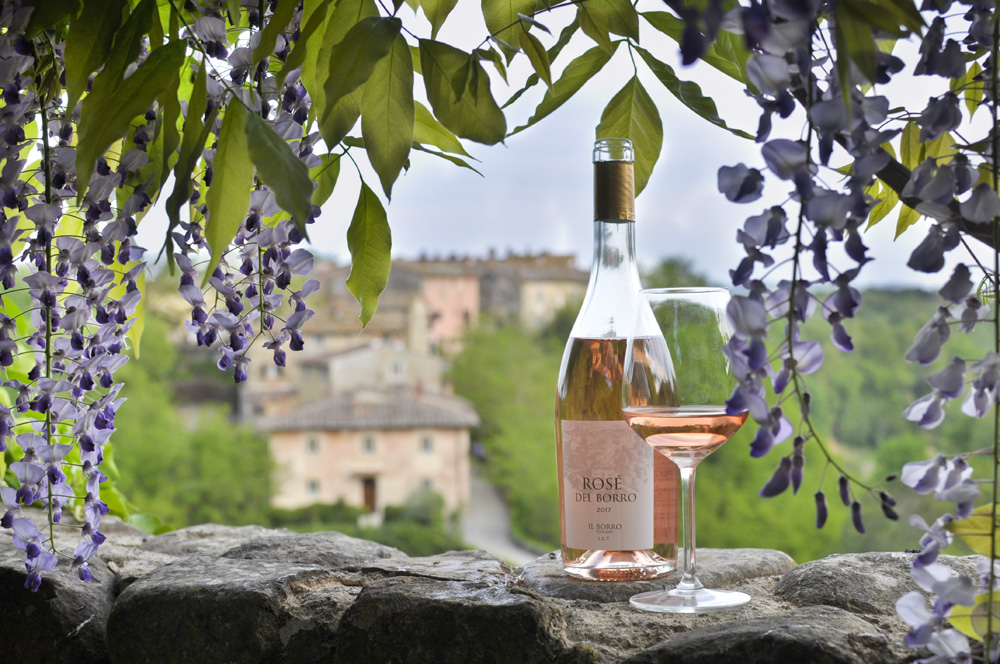
Il Borro’s rosé and a view of the historic hamlet of Il Borro | ph. Alexandra Korey
HF: Are you working on any new projects at the estate? Are you planning to release any new wines?
SF: We’re actually working on a fantastic new project called Pegasus, which is a code name because we haven’t come up with the final name of the wine, and we’re still working on the packaging. We’re all horse lovers in the family, and Vittoria is a fantastic show jumper; her husband races horses and her son does all kinds of competitions. So we said, “Why don’t we dedicate one vineyard, one or two hectares of Cabernet Sauvignon, to creating a completely biodynamic wine: we’ll turn the soil only by horse and plough, so that we don’t create soil compression on the foot of the vines. This was a 2018 vintage, a wonderful vintage: I’ve been trying it, and it’ll be released at the next Vinitaly.
HF: Something else we’ve seen in these months is the explosion of online wine purchasing. In terms of ordering Il Borro wines online, have you changed your strategy at all?
SF: We do have a website called Il Borro Wines [see below for a special discount for readers!], but we’ve had to adapt to a complete change of pace. Until now, we had been selling wines to established restaurants. We don’t produce a lot of wine, you see, about 180,000 bottles for the whole world, and that gets allocated to different markets. We’ve always worked with the restaurants, who have been incredibly supportive, but of course with the Coronavirus we’ve completely lost that channel of distribution. So we’ve literally reinvented ourselves overnight and found interesting ways of selling wine online, and one is thanks to Vittoria and her baskets of vegetables: they now include our wines.
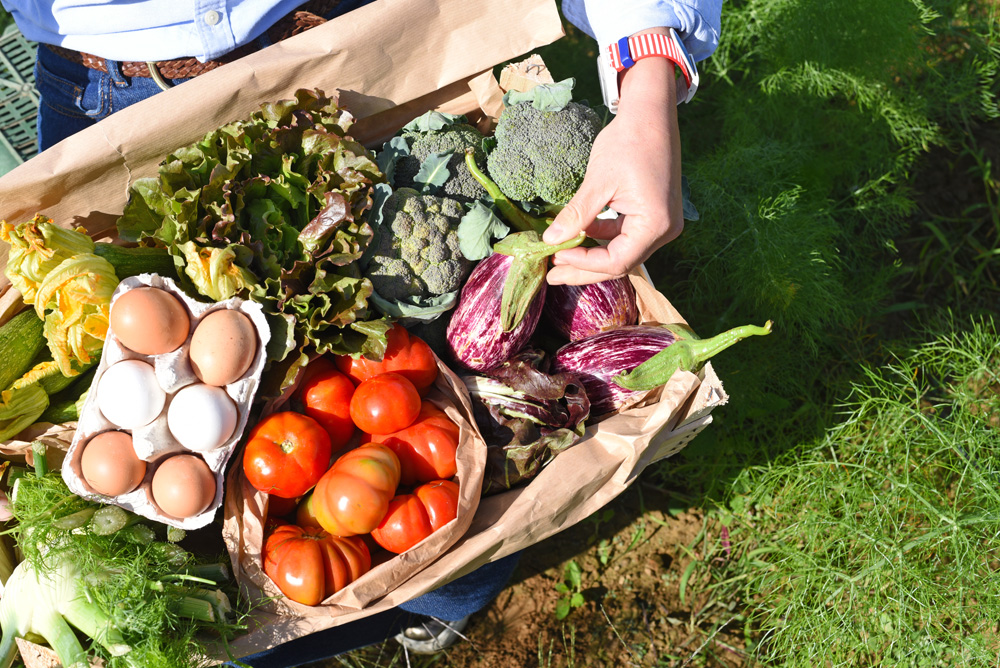
An organic Tuscany farm box from Orto del Borro | ph. Valeria Raniolo
HF: This is off-topic, but these are odd times. Our reader Sheila asks about your grandfather, of whom she’s a great fan. How is his legacy remembered in the family?
SF: We feel his presence greatly, and the presence of our grandmother too, who recently left us. I’ve always tried to live by their values throughout my life. We’re a very close family; we love spending time together. My grandfather’s book, The Shoemaker of Dreams, has so many wonderful tales and stories and lessons to be learned. The true values of life are very present in us, and we do especially feel the presence of our beloved grandmother at this time.
Watch the interview with Salvatore and Vittoria Ferragamo
A special discount for readers of The Florentine!
20% discount on Il Borro Wines – click here!
Enter discount code #TFXILBORRO at checkout.
A special welcome discount is also available for the farm-direct produce boxes of Orto del Borro – click here to purchase and enter #TFXILBORRO at checkout.



